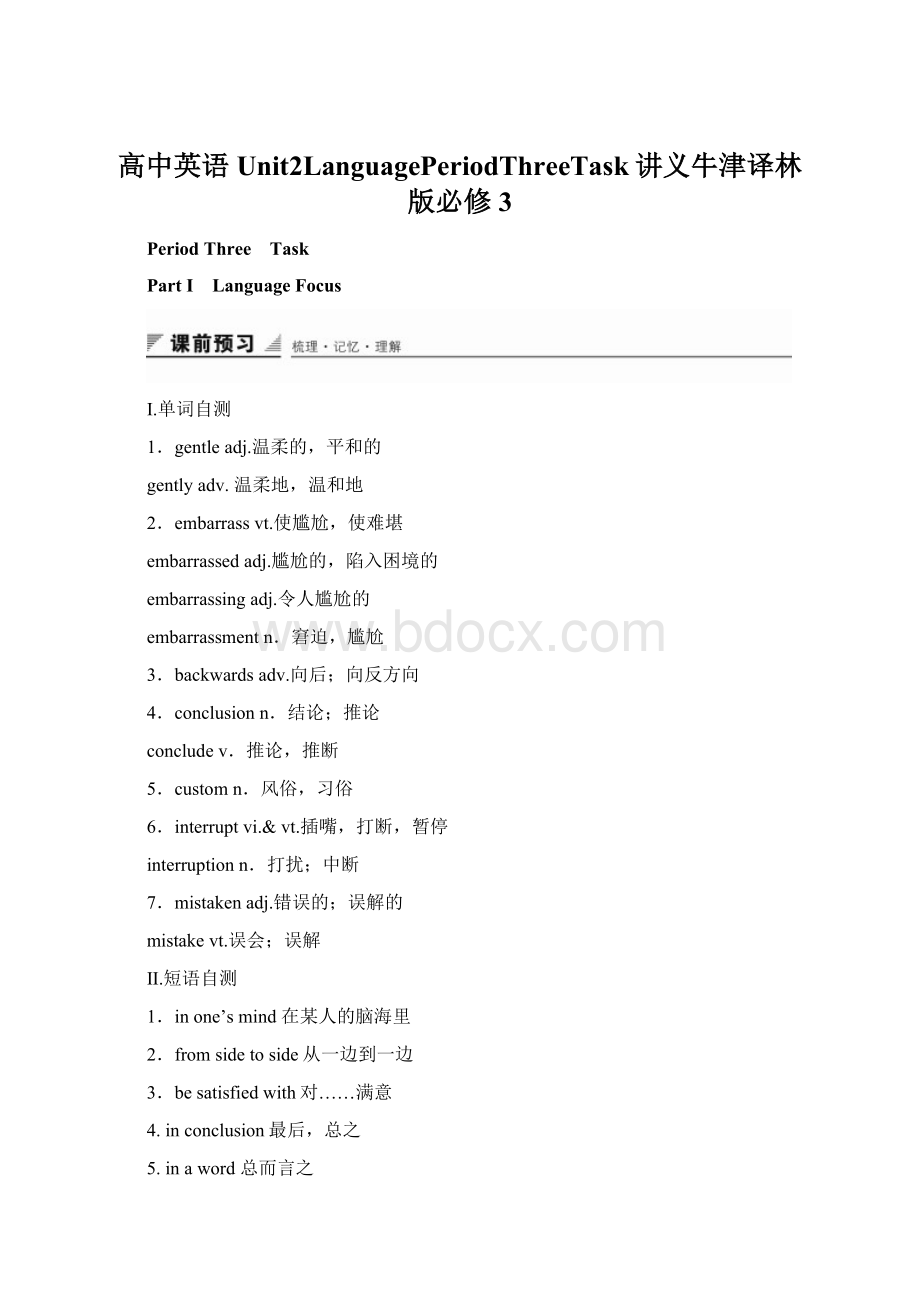高中英语Unit2LanguagePeriodThreeTask讲义牛津译林版必修3.docx
《高中英语Unit2LanguagePeriodThreeTask讲义牛津译林版必修3.docx》由会员分享,可在线阅读,更多相关《高中英语Unit2LanguagePeriodThreeTask讲义牛津译林版必修3.docx(23页珍藏版)》请在冰豆网上搜索。

高中英语Unit2LanguagePeriodThreeTask讲义牛津译林版必修3
PeriodThree Task
PartⅠ LanguageFocus
Ⅰ.单词自测
1.gentleadj.温柔的,平和的
gentlyadv.温柔地,温和地
2.embarrassvt.使尴尬,使难堪
embarrassedadj.尴尬的,陷入困境的
embarrassingadj.令人尴尬的
embarrassmentn.窘迫,尴尬
3.backwardsadv.向后;向反方向
4.conclusionn.结论;推论
concludev.推论,推断
5.customn.风俗,习俗
6.interruptvi.&vt.插嘴,打断,暂停
interruptionn.打扰;中断
7.mistakenadj.错误的;误解的
mistakevt.误会;误解
Ⅱ.短语自测
1.inone’smind在某人的脑海里
2.fromsidetoside从一边到一边
3.besatisfiedwith对……满意
4.inconclusion最后,总之
5.inaword总而言之
6.oughtto应当,应该
1.embarrass
[语境感悟]
(1)(教材P35)Sheismakingfunofyouandtryingtoembarrassyouintotryingharder.
她在跟你开玩笑,想通过使你觉得尴尬而促使你更加努力。
(2)Tomseemedembarrassedbythequestion.
汤姆似乎被这个问题弄得有些窘迫。
(3)Muchtoherembarrassment,sherealizedthateverybodyhadbeenlisteningtohersinging.
她意识到大家一直在听她唱歌,感到很不好意思。
[归纳拓展]
(1)embarrassvt.使尴尬,使难堪
embarrasssb.intodoingsth.令某人尴尬而促使其做某事
(2)embarrassingadj.令人为难的
(3)embarrassedadj.感到难堪的;尴尬的
(4)embarrassmentn.困窘,尴尬
toone’sembarrassment令某人尴尬的是
[即时跟踪]
(1)用embarrass的适当形式填空
①Hisfacetookonanembarrassedsmilewhenheheardtheresultofthecompetition.
②MymostembarrassingmomentwastryingtointroduceawomanwhosenameIcouldn’tremember.
③Shesufferedextremeembarrassmentatnotknowinghowtoread.
(2)—Howdoyouthinkawomanwillfeelifsheisaskedaboutherage?
—Well,shemayprobablyfeel.
A.amusedB.amusing
C.embarrassedD.embarrassing
答案 C
解析 句意为:
——你认为一个妇女如果被问及年龄她会觉得如何?
——噢,她可能觉得很尴尬。
amused被逗乐的,愉快的,顽皮的;amusing有趣的,好玩的,引人发笑的;embarrassed尴尬的,害羞的;embarrassing使人害羞的,难堪的。
根据题意可知选C。
(3)Masha,ahostessonaChineseTVprogram,couldnotforgetthosemomentswhenshefirstarrivedinChina,aboutChineseculture.(2016·盐城中学高一期中)
A.embarrassing,confusing
B.embarrassed,confusing
C.embarrassing,confused
D.embarrassed,confused
答案 C
解析 句意为:
玛莎,一个做中国电视节目的主持人,不能忘记她第一次来中国时那些令人尴尬的时刻,以及对中国文化的困惑。
“令人尴尬的时刻”,应该是ing结尾的形容词,beconfusedabout对……感到困惑。
这里是非谓语动词的位置,所以用形容词confused。
2.backwards
[语境感悟]
(1)(教材P35)Hishandfacesupandhisfirstfingermovesbackwardsandforwards.
他的掌心向上,食指前后移动。
(2)Sherockedbackwardsandforwardsonherchair.
她坐在摇椅上前后摇晃着。
(3)Hedoesn’twanttoliveinabackwardcountryincivilization.
他不想住在一个文明程度低的国家。
[归纳拓展]
(1)backwardsadv.向后;向反方向
backwardsandforwards来来回回
bend/leanoverbackwards(todosth.)尽力/竭力(做某事)
(2)backwardadj.向后的;朝后的
[即时跟踪]
(1)Iamaslowwalker,butIneverwalkbackwards.
我走得很慢,但我决不后退。
(2)They’llbend/leanoverbackwardstohelpyou.
他们会尽全力来帮你的。
(3)Whenahouseishitbyatornado,itexplodes.
A.outwardsB.inwards
C.backwardsD.downwards
答案 A
解析 句意为:
房子被龙卷风袭击时会向外破裂开。
outwards向外,符合常识。
inwards向内;backwards向后;downwards向下。
3.interrupt
[语境感悟]
(1)(教材P37)Saying‘sorry’ifweinterruptordisagreewithsomeonealsohelpsustobepolite.
当我们打扰或不同意某人的看法时说声“对不起”也会使我们显得有礼貌。
(2)Don’tinterruptthespeakernow;hewillanswerquestionslater.
现在不要打断演讲者讲话,他稍后会回答问题。
(3)Shetoldhersonnottodisturbhisfather.
她告诉儿子不要妨碍他爸爸。
(4)Theyweretroubledbydisagreementamongfamilymembers.(2015·安徽)
他们因家庭成员之间的分歧而烦恼。
[归纳拓展]
interruptvi.&vt.插嘴;打断;暂停
[易混辨析] interrupt/disturb/trouble
(1)interrupt指使原来正在进行的活动中断或停顿下来,尤指打断别人谈话。
(2)disturb指妨碍工作的进行或使人不能安宁。
(3)trouble指一般的烦恼、打扰或烦恼不安。
[即时跟踪]
(1)选词填空
①Herson’sillnessdisturbedher,andshefeltupset.
②I’msorrytointerruptthemeeting,butthereisanurgentlongdistancecall.
③Wewereinterruptedinthemiddleofourconversation.
④Idon’twanttotroublethedoctorwithsuchasmallproblem.
(2)Productioninthefactorywasforacoupleofhoursbecausetheelectricitywascutoff.
A.disturbedB.interrupted
C.missedD.lost
答案 B
解析 句意为:
工厂的生产因电源切断而中断了几个小时。
interrupt中断,符合句意。
disturb打扰;miss错过;lose失去。
4.mistaken
[语境感悟]
(1)(教材P37)Forexample,whenwedisagree,itismuchbettertosay‘I’msorry,butIthinkyoumaybemistaken’ratherthan‘You’rewrong!
’
例如,当我们不同意对方的观点时,最好是说“对不起,我想你可能误会了”,而不是说,“你错了!
”
(2)Ithinkyou’vemadeamistake—thisisn’tmycoat.
我想你弄错了,这不是我的大衣。
(3)Ithinkyoumustbemistakingmeforsomeoneelse.
我想你一定是把我错认成其他人了。
[归纳拓展]
(1)mistakenadj.错误的;误解的
bemistakenaboutsb.误解某人
(2)mistaken.错误的行为(看法、陈述),误会;v.弄错,误会,误解
bymistake错误地(并非故意)
makeamistake犯错误,搞错了
mistakesb./sth.forsb./sth.把某人/某物误认为某人/某物
[即时跟踪]
(1)Sheisoftenmistakenforafamoussinger.
她常常被误认为是个著名歌手。
(2)Igotonthewrongbusbymistake.
我搭错了公共汽车。
(3)Whenyoumakeamistakeatwork,learnfromitandtryagain.
当你在工作中犯了错,从中学习并再次努力。
(4)IthinkyouarecompletelyJane.
A.mistakingforB.mistookfor
C.mistakenaboutD.mistookby
答案 C
解析 句意为:
我想你完全误解简了。
bemistakenaboutsb.误解某人。
B项和D项都须改为mistaken,分别表示“你被误当作简了”和“你被简完全误解了”。
1.inone’smind
[语境感悟]
(1)(教材P32)Evenifyoualreadyhaveananswertothequestioninyourmindbeforelistening,itisstillimportanttoconcentrateonthatsubjecttomakesurethatyourguessiscorrect.
即使在听之前你脑海里已经有了相关问题的答案,集中注意力听主题来验证你的猜测是正确的,这也很重要。
(2)Atthattime,somethingstrangeappearedinhismind.
那时,他脑海里出现了奇怪的东西。
(3)AtlasthechangedhismindandleftforBeijing.
最后他改变主意去了北京。
(4)I’vemadeupmymindtobeadoctor.
我决心成为一名医生。
[归纳拓展]
inone’smind在某人的脑海里
have...onone’smind/beonone’smind牵挂……;担心……
changeone’smind改变主意
comeintoone’smind掠过/进入某人的脑海
beoutofone’smind发疯
makeupone’smind下定决心
keepinmind记住
[即时跟踪]
(1)Suddenly,aterriblethoughtcameintomymind.
突然,一个可怕的念头出现在我的脑海里。
(2)Ifyoumakeupyourmindtodoit,youwillcertainlyreachyourgoal.
如果你下定决心去做,你一定会达到目的的。
(3)Fred,whohadexpectedhowitwouldgowithhisdaughter,hadagreatworryhismind.
A.onB.in
C.withD.at
答案 A
解析 句意为:
弗雷德一直担心他女儿的情况到底怎么样了。
have...onone’smind意为“牵挂……,担心……”。
2.inconclusion
[语境感悟]
(1)(教材P36)Inconclusion,weneedtoknowthecustomsofacountrysothatwedonotmakeothersembarrassedorannoyed.
总之,我们需要了解一个国家的风俗,以便我们不会让别人尴尬或烦恼。
(2)Wecametotheconclusionthattheroommusthavebeenemptythen.
我们得出的结论是,那个房间当时一定是空着的。
(3)Heconcludedfromtheirremarksthattheywerenotinfavouroftheplan.
他从他们的话语中推断出他们不赞同此项计划。
[归纳拓展]
(1)inconclusion最后,总之
conclusionn.结论;推论;结束;结尾
arriveat/cometo/draw/reachaconclusion得出结论
jump/leaptoconclusion匆忙下结论,贸然断定
(2)concludev.断定,推断出,得出结论,结束
concludeby/with以……结束
concludefrom从……中得出结论;推断
[即时跟踪]
(1)Afterthetalk,theydidn’tcometoanyconclusion(没得出任何结论).
(2)Inconclusion(最后),IwouldliketosayhowmuchIhaveenjoyedmyselftoday.
(3)Whenthegroupdiscussionisnearingitsend,makesuretoitwithimportantpoints.(2013·浙江,9)
A.concludeB.lead
C.avoidD.hold
答案 A
解析 句意为:
当小组讨论接近尾声时,要确保得出重要结论。
conclude结论,符合题意。
lead引导;avoid避免;hold举行,故选A项。
(4)PersonallyIthinktheAndrewdrewfromhissimpleexperimentisnotscientific.(2016·东台创新高中高一月考)
A.conclusionB.decision
C.informationD.invention
答案 A
解析 句意为:
我个人而言,安德鲁从简单的实验中得出的结论是不科学的。
conclusion结论,词组:
drawaconclusion得出结论,符合句意。
decision决定;information信息;invention发明。
3.oughtto
[语境感悟]
(1)(教材P37)Wealsooughttoshowduerespecttopeopleolderthanus.
我们也应当向比我们年龄大的人表现出应有的尊重。
(2)Suchthingsoughtnottobeallowed.
这种事应该被禁止。
(3)I’msorry.IoughttohavephonedtotellyouIwascoming.
对不起,我本应该先给你打个电话告诉你我要来。
[归纳拓展]
(1)oughtto情态动词,意为“应该,应当”。
(2)oughtto后接动词不定式的完成时,表示对过去存在的某种可能性的推测,或指过去该做而未做的事情,意思是“早应该,本应该”。
若是否定句,则表示发生了不该发生的事。
注意:
oughtto的否定形式是oughtnotto或oughtn’tto。
[即时跟踪]
(1)Heoughtn’ttohavebeendrivingsofast.
他本不该把车开得那么快。
(2)Parentsbringuptheirchildrenunder16andeducatethemproperly.
A.couldB.may
C.mightD.oughtto
答案 D
解析 句意为:
父母应该抚养16岁以下的孩子并正确地教育他们。
oughtto应该,应当。
1.Thereisnoneedtodosth.
[语境感悟]
(1)(教材P32)Whenyouarelateforasmallmeeting,thereisnoneedtosay‘sorry’.
当你在一次小会议上迟到时,没有必要说“抱歉”。
(2)Thereisnoneedforyoutowait.
你没有必要等。
(3)Isthereanyneedtoexplainfurther?
=Isthereanyneedforfurtherexplanation?
有必要更进一步解释吗?
(4)Itisnotnecessaryforyoutovisittheschool.
你没必要参观那个学校。
[归纳拓展]
(1)Thereisnoneed(forsb.)todosth.(某人)没必要做某事。
(2)该句式中need为不可数名词,可用介词短语或不定式作定语,主要构成句式:
Sb.hasneedfor/todo...;Thereisa(great,etc.)needfor...;Thereisa(great,etc.)needforsb.todo...。
no也可以被some,any,(not)much,little等词替换,表示“(对某人来说)做……是(没)有必要的”。
还可用:
Itis(not)necessary(forsb.)todo...,其中necessary不能以人作主语。
[即时跟踪]
(1)Thereisnoneedtotellmeyouranswernow.Giveitsomethoughtandthenletmeknow.(2015·安徽)
现在没有必要告诉我你的答案。
思考一下,然后让我知道。
(2)Hehasn’tsleptatallforthreedays.heistiredout.
A.Thereisnopoint
B.Thereisnoneed
C.Itisnowonder
D.Itisnoway
答案 C
解析 句意为:
他已经三天没有睡觉了,怪不得他疲惫不堪。
Itisnowonder(that)...意为“难怪……”,符合句意。
2.where的用法
[语境感悟]
(1)(教材P37)PeoplefromtheWestliketousethesewordsincaseswheresomepeopleinAsiamaynotthinkitnecessary.
在一些亚洲人或许认为没有必要用这些词的情况下,西方人喜欢使用这些词。
(2)Untiltodaywehavereachedastagewherewehavealmostnorightsatall.
直到今天我们还处在一个几乎没有权利阶段。
(3)He’sgothimselfintoadangeroussituationwhereheislikelytolosecontrolovertheplane.
他使自己处于一种危险的处境,在这种情况下他很可能失去对飞机的控制。
[归纳拓展]
(1)教材原句中where引导定语从句,并在从句中作地点状语,先行词为cases。
(2)当cases意为“情形,情况”,表示抽象地点时,其后的定语从句的引导词通常用where或inwhich。
英语中诸如case这样表示抽象地点的名词还有stage,position,situation,point,occasion,career,degree等,这些名词充当先行词时,若定语从句的引导词在从句中作状语,则引导词用关系副词where,where可用“相应的介词+which”替换;若引导词在从句中作主语或宾语,则引导词用that/which。
此外,记住这几个常见的表示抽象地点的名词对解题也大有帮助。
[即时跟踪]
(1)Therearemanycaseswherethepenismightierthanthesword.
在许多情况下,文比武更强大。
(2)IadmiremyEnglishteacherverymuchforshehasaspecialabilitytosimplifyseemscomplicated,andalwayscreatesanatmosphereallthestudentsfeelrespectedandcaredfor.(2016·溧水高级中学高一期中)
A.it;thatB.that;that
C.what;whichD.what;where
答案 D
解析 句意为:
我很佩服我的英语老师,因为她具有简化所有看起来很复杂的事情的特别能力,并且总能创造出一种让所有的学生都感到受人尊敬和关心的氛围。
第一空是个宾语从句,连词在句中作主语,it不能连接句子,that在从句中不充当成分,排除A和B。
第二空是个定语从句,先行词是atmosphere,关系词在从句中作状语,用where。